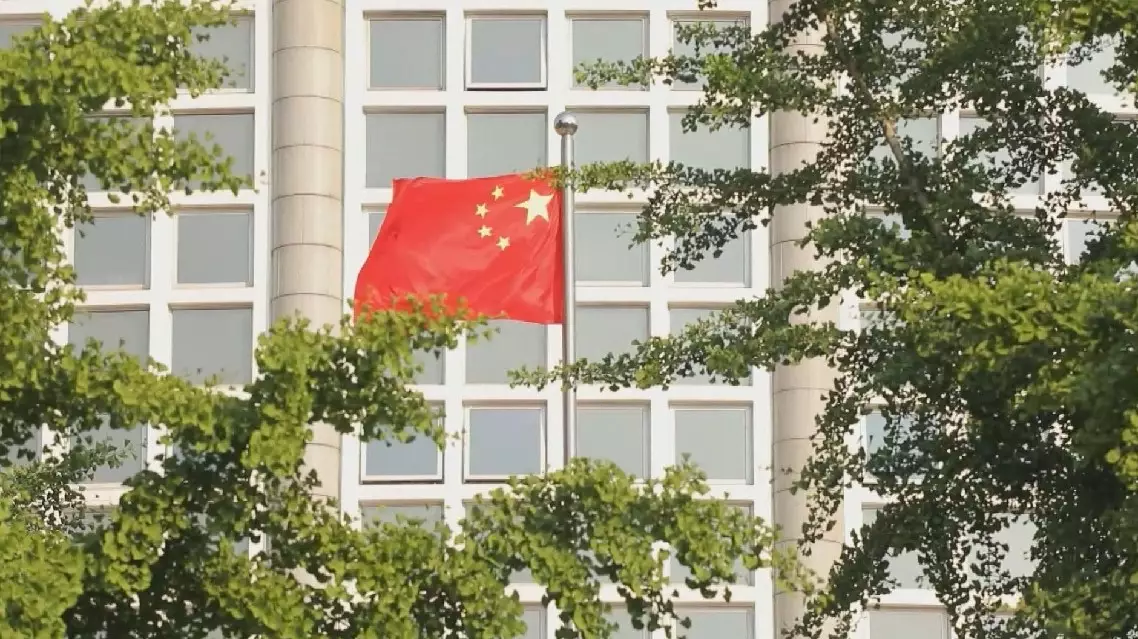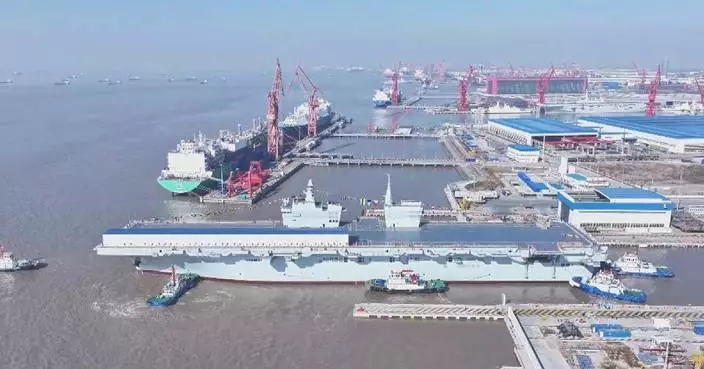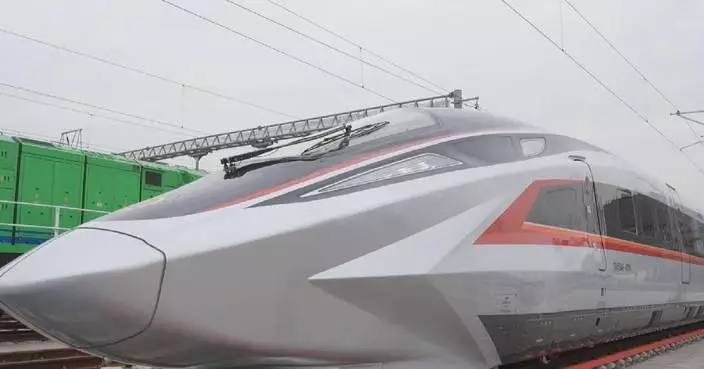China is advancing reform in foreign exchange business to streamline procedures and provide operational guidance for enterprises, with six supporting rules released on Friday to further define the rules and standards for key aspects of bank operations.
The reform has effectively helped foreign trade enterprises save time in processes and improve business efficiency, according to Cheng Siyuan, a financial staff member at the Hiking comprehensive foreign trade service platform in Qingdao City of east China's Shandong Province.
Cheng's main job is to handle foreign exchange transactions for small and medium-sized foreign trade enterprises.
"I need to process 68 foreign exchange transactions today. I only need to issue the receipt and payment instructions online, and submitting an application for each transaction takes just a few seconds. The bank can complete the process in a few minutes if it's efficient. Now, most transactions are submitted and completed on the same day," said Cheng.
Since the launch of the foreign exchange business reform, high-quality enterprises with stable operating conditions and high credibility can process certain foreign exchange transactions online.
Data show that by the end of November, 10 commercial banks across China had joined in the foreign exchange business reform, covering 31 provinces, autonomous regions, municipalities directly under the central government, and five cities with independent budgetary status. Over 15,000 high-quality clients, including small and medium-sized enterprises and private companies, have been included.
"Banks no longer need to conduct audits and verifications one by one on every foreign exchange transaction while cooperating with these enterprises. The average processing time has been shortened by 50 to 75 percent. Additionally, banks can innovate and customize various facilitation services and products based on the client's risk level, allowing for a more precise alignment with customer needs," said Li Bin, deputy head of the State Administration of Foreign Exchange.

Forex business reform improve efficiency, provides guidance for firms
Chinese international relations experts have reviewed the highlights of China's diplomacy in 2024, saying the country demonstrated its responsibilities as a major power and acted as a "stabilizing force" on the world stage by making significant contributions to global peace and development.
This year, Chinese President Xi Jinping attended three major diplomatic events hosted in China and made four significant overseas visits, consistently calling for stronger win-win cooperation to build a better world.
Cui Hongjian, a professor of the Academy of Regional and Global Governance of Beijing Foreign Studies University, noted that such high-level diplomacy featuring President Xi has helped pave the way for peace and development, and has sent out strong signals of China's vision of a shared future for mankind.
"Looking back at China's diplomacy in 2024, I think the most remarkable highlight remains the head-of-state diplomacy. We saw that this year, President Xi demonstrated the charm of Chinese diplomacy, both in terms of major home-ground events such as the Forum on China-Africa Cooperation, and in terms of traveling aboard to attend events including the APEC Economic Leaders' Meeting and G20 Summit in Latin America. It also reflected the global vision of China's diplomacy featuring benefiting people and striving for welfare and peace for the world," said Cui.
Professor Niu Xinchun of the China-Arab Research Institute at Ningxia University highlighted China's efforts in advocating for peaceful solutions in the war-torn Middle East.
"Two things impressed me the most [in 2024]. One was China's repeated efforts in promoting peace talks at the United Nations General Assembly and the UN Security Council, striving for peace in the Middle East. The second was the reconciliation among 14 Palestinian factions in Beijing mediated by China," said Niu.
Wang Wen, the executive dean of Chongyang Institute for Financial Studies of Renmin University of China, lauded the transformative impact of the Chancay Port in Peru, an important infrastructure project in Latin America under the China-proposed Belt and Road Initiative (BRI) which was inaugurated during President Xi's visit to Peru in November.
"We helped build the Chancay Port in Latin America, which instantly changed the economic landscape and structure of the region and even the entire Western hemisphere. The port will bring enormous economic growth and new momentum for economic restructuring to the entire Latin American region," he said.
Meanwhile, Wu Shicun, chairman of Huayang Research Center for Maritime Cooperation and Ocean Governance, said China has sought to safeguard territorial sovereignty and maritime rights and interests in the South China Sea over the past year.
"In 2024, although we faced more challenges in the South China Sea, the achievements we made in safeguarding our rights and maintaining stability were significant. We demonstrated stronger determination with more forceful methods," said Wu.
Many analysts also hailed how China's diplomatic approach throughout 2024 has created a sound external environment for advancing global development, and say the country has also helped inject valuable stability into an increasingly volatile world.
"China has consistently played the role of a responsible major power. We have continuously upheld the international system with the United Nations at the core, emphasized on the international order underpinned by international law, and reinforced the basic norms of international relations based on the purposes and principles of the UN Charter. In other words, when the world order faces significant challenges, China has pushed global development in the right direction with this vision," said Gao Fei, the vice president of China Foreign Affairs University.
"From the interactions between China and the U.S. in 2024, we can see that China's approach to managing relations with major powers has become increasingly mature. The China-U.S. relationship has maintained relative stability, as both countries realize that stability meets the needs of both sides. Moreover, both countries recognize that the international community in general expects to see stable China-U.S. relations, and there should be more space for cooperation between these two major powers," said Su Xiaohui, the deputy director of the Department for American Studies of China Institute of International Studies.
"We promoted the high-quality Belt and Road cooperation, hosted Forum on China-Africa Cooperation and granted zero tariffs treatment to the least developed countries in the world. Through development cooperation, China has injected confidence and vitality into the stabilization and recovery of the global economy," said Song Wei, professor of School of International Relations from Beijing Foreign Studies University.
"China has consistently played a positive role and acted a stabilizing force in response to the increasingly complex issues of peace and security. China's actions are not guided by its selfish interests. In addressing the complex regional conflicts such as the Russia-Ukraine conflict and the Israel-Palestine conflict, and in solving development issues for Latin America and other developing countries, China always upholds the principle of fairness and justice," said Cui.
Looking ahead to 2025, experts noted that further uncertainties are likely to persist in terms of the global landscape, but they believe China will continue to play a constructive role in promoting global peace and development against this challenging backdrop.
"I think the profound evolution of the international order will continue in 2025. When handling relations with Western countries, China will maintain stable relations with them, focusing on dialogue, communication, and engagement. Meanwhile, China will continue to strengthen ties with the Global South in 2025. China will host the Shanghai Cooperation Organization (SCO) summit next year, and it will play an even more active role within the organization," Cui said.
"At the beginning of 2025, the United States will see a power transition with Donald Trump setting to assume office. Many of the allies and partners of the U.S. are now concerned that their relationships with the U.S. may change and that they will be affected by Trump's policies. In 2025, China will adhere to the basic principles in the development of China-U.S. relations, emphasizing bottom lines and red lines, while actively shaping the bilateral relationship and promoting the U.S. to move in the same direction with China," said Su.

China's diplomacy in 2024 demonstrates responsibility of major country: analysts










